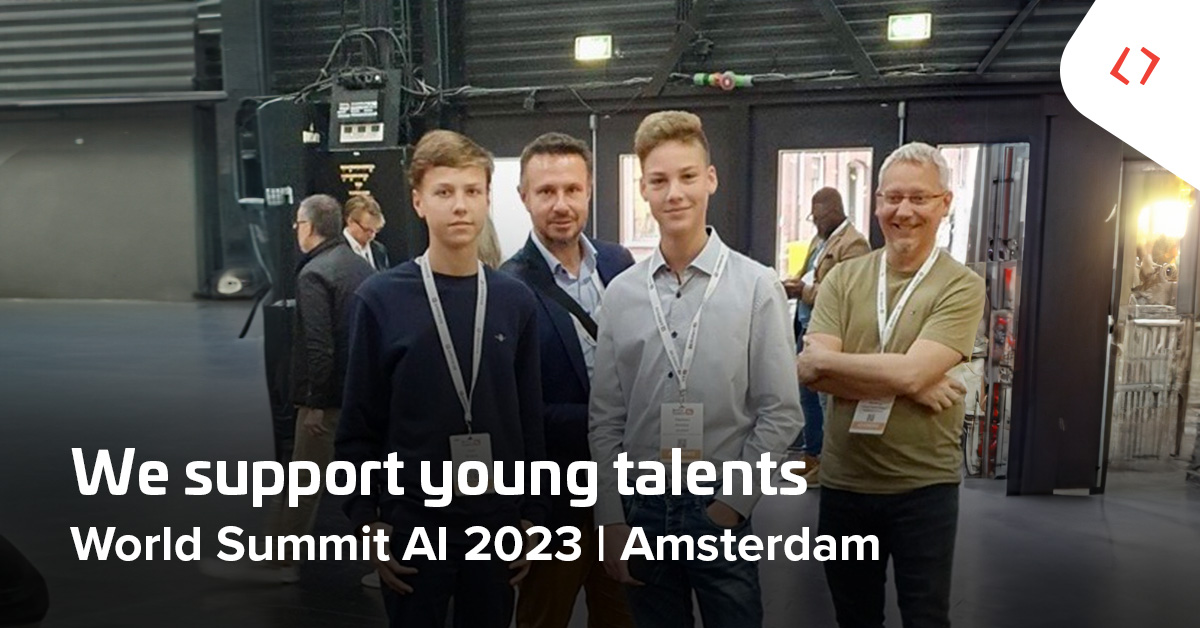At Profinit, we not only believe in the power of education, we actively support it. Our way of supporting education ranges from the internal Profinit Education system to teaching IT subjects at leading universities to organizing the prestigious competition for the best IT diploma thesis of the year. We also supervise students’ final theses, collaborate with universities on research projects and support talented students financially. Read the interview with the director of the Montessori Polná school, Mgr. Lenka Markova, and her gifted student Vladislav, whom we took to the World AI Summit in Amsterdam this year.
What kind of student is Vladislav and how is his talent manifested?
Mgr. Lenka Marková, director of the Montessori Polná school: Vladislav is intensively and consciously devoted to self-development in many fields, he has a strong intrinsic motivation, and he works very well with his time, allowing him to do both the work assigned by teachers and work on his own projects within the school curriculum. He is now working intensively on developing his IT skills, specialising in AI and its applications. He is programming, preparing content for his outreach YT channel, improving his rhetorical skills and studying the latest information in these areas.
How many students study with you and what makes Vladislav different from other students?
Mgr. Lenka Marková, director of the Montessori Polná school: There are currently 6 students in the first year of the secondary school, which opened in September 2023. We have 65 students in the primary school and another 30 children in the kindergarten. We are a community school that connects students and children of all ages. Vladislav particularly stands out due to his time management skills. He is always willing to take part in extra-curricular activities, and is currently heading several large school projects – for example, he runs the school bistro, which provides refreshments at events for classmates, parents and/or the public; he is involved in the design of the school’s new venture, the Eco-Centre, where he leads a team of collaborators; and he communicates with the authorities and private entities, as well as with the school management.
How was the AI conference in Amsterdam that you attended? What did you like the most?
Vladislav Korecký, student at the Montessori Polná school: After registering on the first day, we attended an introductory lecture, and then on both days we chose the topics that interested us in the app. The advantage was that we could schedule the individual tracks through the app. In between each track, we were interested in the exhibitors in the main hall, walking between booths and finding out about practical applications of technologies such as computer vision and LLM (Large language models). Among the most interesting activities, I would definitely include our informal interaction with colleagues from Profinit and Raiffeisenbank, for me it was definitely valuable thanks to the exchanging of views and getting experience from people in the field.
What were your takeaways from the conference?
Vladislav Korecký, student at the Montessori Polná school: The conference as such was a great experience for me and helped me to understand the topic of AI more deeply. I really excited about the whole trip. I really enjoyed the talk by Amazon CTO Werner Vogels, who emphasized the importance of data over technology. I would like to attend similar events in the future.
Is support from private companies important for the school?
Mgr. Lenka Marková, director of the Montessori Polná school: Our school was founded in 2019 with one component – the primary school, which at that time had 15 pupils from the first to the ninth grade. To date, we have been able to expand educational services for ages two and up to the newly opened secondary level of education. This rapid growth requires very flexible budget management. We welcome cooperation with private companies not only in terms of possible financial participation but also because of our common interest – to give our students insight into the real working environment.
